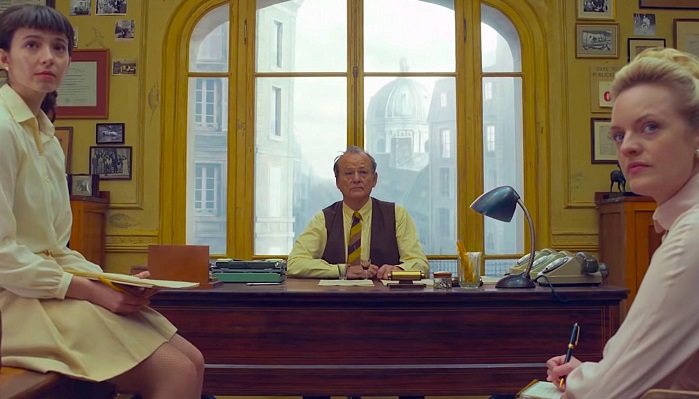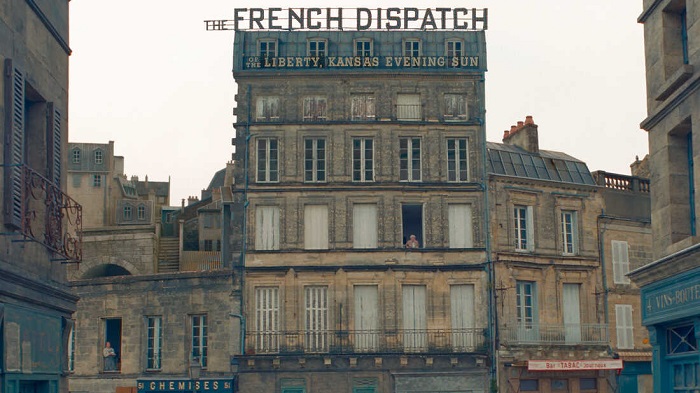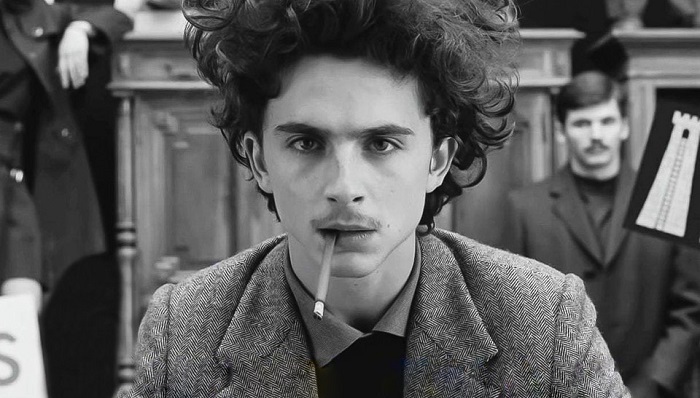Wes Anderson is undeniably an acquired taste, and for some moviegoers a little of his unique signature style can go a long way. If you’re one of those viewers who can only handle Wes Anderson in small doses, then his new film “The French Dispatch” probably isn’t for you. It is very much Wes Anderson. It’s a lot of Wes Anderson. In fact, it’s without question the most Wes Anderson thing he has done to date.
If that hasn’t scared you off then there’s a good chance you’ll find something to enjoy in “The French Dispatch”. As a long time indulger in all things Wes Anderson, this had a lot of what I was looking for from his movies: the quirky characters, the delightfully distinct visual style, Anderson’s dynamic use of language. And like many of his other films, it’s one I feel I need to see again and again in order to get a satisfying grasp of what he’s going for. For me that’s part of the Anderson allure.
With all of that said, I’ve wrestled more with “The French Dispatch” than any Wes Anderson movie to date. The parts of it that I like, I really really like. But I’ve had a harder time embracing this particular Anderson excursion as a whole. Part of it has to do with the film’s anthology structure which features an opening travelogue and three short stories loosely connected by a wraparound account of the eponymous publication’s final issue (whew, even that description sounded perversely Wes Andersonian). This approach inevitably (and unintentionally) highlights the film’s stronger segments and the weaker ones. And it’s in those weaker moments that we learn small concentrated doses of Anderson can sometimes be overpowering.
This unabashed love letter to the journalistic spirit is told through the writing of a group of expats bound together by the pages of a New Yorker inspired periodical titled (of course) The French Dispatch. The magazine began as a Sunday supplement in the Liberty, Kansas Evening Sun before being relocated to France and transformed by founding editor and publisher Arthur Howitzer Jr. (Bill Murray). Howitzer had an eye for talent and would bring them into his fold, looking past their blemishes and encouraging them to use their voices. He had his ways with suggestion (“Just try to make it sound like you wrote it that way on purpose”) and he certainly had his rules (“No Crying”). But Howitzer is dedicated to “his people”. Well, most of them.
His newsroom is filled with a collection of Anderson regulars and several newcomers, all part of a meticulously chosen ensemble and each with the stone-faced solemnity needed to exist in an Anderson world. The wraparound story gives us many of the film’s best moments as we watch Howitzer and his crack team of writers and editors going over what unexpectedly turns out to be the final issue of The French Dispatch. The dry, crisp, and often hilarious dialogue is only matched by the sets, each obsessively detailed compositions where every prop seems placed with painstaking purpose.
Following a smile-inducing Tati-inspired opening, we get what may be my favorite part – a brief opening travelogue for the paper’s “Local Color” section where Owen Wilson’s travel correspondent Herbsaint Sazerac treats us to the sights and sounds of the fictional French town of Ennui-sur-Blasé (which literally means Boredom-on-Blasé). With his black beret, chic turtleneck, and green knickers, Sazerac takes us on a bicycle tour, staring into the camera as he pedals through the seedier crevices of the less than idyllic village. The segment delightfully mixes Anderson’s visual flourishes with Wilson’s sly wit.
From there it’s on to the first feature story (“The Concrete Masterpiece”) written by the Dispatch’s art critic J. K. L. Berensen (Tilda Swinton). It tells the story of Moses Rosenthaler (Benicio del Toro), an incarcerated killer and oil painter extraordinaire (sorta), locked in an icy romance with his enigmatic prison guard muse (Léa Seydoux). The two get involved with a shifty art dealer Julien Cadazio (Adrien Brody) who sees francs in Rosenthaler’s art.
For the “Politics & Poetry” section, ace reporter Lucinda Krementz (Frances McDormand) pens “Revisions to a Manifesto”, Anderson’s whimsical version of the 1968 student protests in Paris. Krementz centers her piece on a moody student radical named Zeffirelli (Timothée Chalamet) who fights not for civil rights or the end of imperialistic oppression, but for free access to the women’s dorm. Krementz, a firm unbeliever in the concept of “journalistic objectivity”, throws herself into the fray, helping young Zeffirelli with his manifesto and stirring up trouble between him and fellow revolutionary Juliette (Lyna Khoudri).
The final feature (“The Private Dining Room of the Police Commissioner”) is written by Roebuck Wright (Jeffrey Wright), a James Baldwin inspired foodie with a “typographic memory”. In his story Wright recounts a private dinner with the Ennui Police Commissaire (Mathieu Amalric). The meal is prepared by renowned chef and police lieutenant Nescaffier (Steve Park). The cozy feast is crashed by a band of thugs who kidnap the Commissaire’s son Gigi (Winston Ait Hellal). The entire police force is detached to track down the hoodlums. The story ends with an animated chase sequences that’s as peculiar as it is audacious. It also happens to be one of my favorite sequences in the entire film.
Each story comes with its own distinct flavor and all are told through unique points-of-view. And while the segments each have their own strengths, they also have their own shortcomings. “The Concrete Masterpiece” is the most well-rounded of the three shorts. However there’s a moment when Anderson’s uncomfortable gaze nearly crosses the line from artistic to lurid. “Revisions to a Manifesto” sees some great new faces enter the Anderson-verse (McDormand, Chalamet, Christoph Waltz). But its second half wanders and is the one point where the movie drags. “The Private Dining Room” may be the most poignant, yet it’s also frustratingly overwritten to the point of being a chore to follow.
While the stories can be a bit erratic, the visuals are a steady joy from start to finish. Cinematographer Robert Yeoman’s images could fill a postcard rack. Together, he and Anderson dip into all kinds of techniques to create a vivid living, breathing tapestry. They play around with the aspect ratios, cross back-and-forth between black-and-white and color, and use several of Anderson’s favorites touches (his side-scrolling dollhouse trick, his low-cut angles, the scrupulous editing, the dingy pastels in his color palette). At times it may feel like sensory overload, but I couldn’t take my eyes off the screen and often wanted the pause the movie just to soak in every detail.
“The French Dispatch” isn’t a movie easily defined, yet it’s one that’s very confident in itself. Nearly every frame, every character, and even the stories themselves are rich with influences and inspirations. Unfortunately the movie never slows down, never lets us up for air, and never gives us time to digest what we have consumed. That steady propulsion is embedded in the film’s DNA and is a key part of Anderson’s storytelling design. It can also be exhausting and a bit overwhelming, to the point that it leaves you thinking more about what all you missed rather than what you’ve actually seen. Then again, you could say “The French Dispatch” isn’t as much about the stories being told as it is the art of telling them. I don’t know if I fully buy that, but it’s enough to tide me over till my second viewing, something every Wes Anderson movie requires.





Lovely review, Keith! This is another must-see for me. I totally agree that his movies aren’t, “as much about the stories being told as it is the art of telling them.”
Thanks so much. I’m hoping that a second viewing will help me get a better grasp of the whole thing. There’s so many bits that I really love. But I struggled with other parts, more so than another Anderson flakes.
You’re welcome.
I’m a longtime fan of Wes Anderson as it is very likely I’ll see this (not this week or next week as I have a ticket for Eternals in the next weekend) as I hope it stays at my mulitplex along with Last Night in Soho. Even if it’s a minor Anderson film, it’s likely will be better than other people’s films.
It’s a toughie. This is definitely Wes at his most indulgent and he pushes his very distinct style (which I quite like) a bit too far. I am anxious to watch it again just to see if any of my reservations hold up .
I really want to see this and normally enjoy Wes Anderson, but reviews for this are all over the place so I’m bringing down my expectations.
I love Wes Anderson, but this one was hard to get a grip on. Visually it’s an absolute stunner. And there are several parts in it that I absolutely love. But he gets a little carried away and really tests his audience’s patience in ways I don’t think he has before.
I feel like I had this feeling of “too much”ness with Grand Budapest Hotel. I kind of want him to return to a more simpler narrative a la Bottle Rocket, but fat chance of that now. I don’t want to say I am tiring of his multi-pronged stories but when you have such an unusual style like his and you end up doing the same thing with that style, repetition seems more noticeable? if that makes any sense at all?
It does. And I’ll say this, “The French Dispatch” is even more Wes Anderson than “Budapest”. By a pretty large margin. It’s such an overload that I end up admiring it more than really enjoying it. But I do need to see it again to get a better gauge of it all.
I’m gonna see Lightyear in June
That movie is going to bring in a ton of money.
You should be the first Pixar fan to review it
Great review, and really felt it was exactly how I felt. To start with it was feeling like it was TOO Wes Anderson, which I’d never considered before a possibility, but overall in the end I enjoyed it. I would say the third story was the most satisfying overall, and Jeffrey Wright was a joy in it. Thanks for your review, really helped me make sense of my thoughts.
Thanks so much for the comments. I have really been all over the place with the movie. I’m anxious to watch it again just to see if it changes my mind on certain things.
At some point, earlyish, I was thinking “Well, this isn’t one I’ll bother watching again, probably”, but now I’m already thinking of going back to the cinema to see it again!
Yes, I did go and see it again! It is excellent.
Now for the criterion addition!
It has to be in the works, right?